Čelinac
Čelinac (Serbian Cyrillic: Челинац) is a town and municipality located in Bosnia and Herzegovina. As of 2013, it has a population of 15,548 inhabitants, while the town of Čelinac has a population of 5,097 inhabitants.
Čelinac
Челинац | |
|---|---|
Town and municipality | |
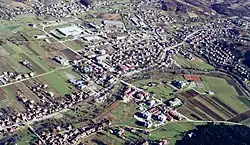 View on Čelinac | |
.svg.png.webp) Coat of arms | |
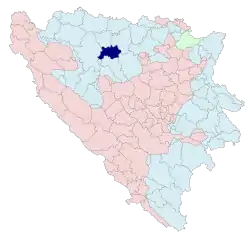 Location of Čelinac within Bosnia and Herzegovina | |
 | |
| Coordinates: 44°43′30″N 17°19′48″E | |
| Country | Bosnia and Herzegovina |
| Entity | Republika Srpska |
| Government | |
| • Mayor | Momčilo Zeljković (SNSD) |
| Area | |
| • Total | 361.81 km2 (139.70 sq mi) |
| Population (2013 census) | |
| • Total | 15,548 |
| • Density | 43/km2 (110/sq mi) |
| Time zone | UTC+1 (CET) |
| • Summer (DST) | UTC+2 (CEST) |
| Area code(s) | 051 |
| Website | www |
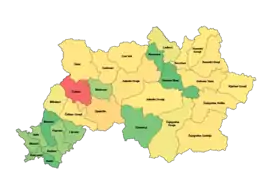
Geography
It is located by Jošavka and Vrbanja rivers, between municipalities of Laktaši and Prnjavor to the north, Teslić to the east, Kotor Varoš, Skender Vakuf / Kneževo to the south, and Banja Luka to the west.
History
War in Yugoslavia
Main initiator and leader of persecution nonserbs population in the valley of the Vrbanja river and Bosanska Krajina, including Čelinac, was member of the radical currents SDS - Radoslav Brdjanin, a native of nearby village of Popovac.
Brđanin was a leading political figure in Autonomous Region of Krajina (ARK). During The war in Bosnia and Herzegovina in the 1990s, was the key positions at the municipal, regional and "republic" level. Among other things, he was the first vice president of the Assembly of the ARK, president of the ARK Crisis Staff and later as Acting Vice Minister for Production, Minister for Construction, Traffic and Utilities and acting Deputy Prime Minister Republika Srpska (RS). International Criminal Tribunal for the former Yugoslavia (ICTY) condemned him for various crimes to 30 years in prison.[1]
During the War in Bosnia, along with other generally known reprisals, local authorities have introduced the original limits of Bosniaks and Croats, i.e. non-Serb population. In addition to those who have experienced this, among other things, bears witness to the indictment against Radovan Karadžić to tribunal in The Hague. At the hearing, Nikola Poplašen, 2013, one of the questions to the witness for the defense, was:
"Being in a statement that the Republiika Srpska there was no discrimination on ethnic grounds, the prosecutor showed the decision of the authorities of the municipality Čelinac of 23 July 1992, in which Croats and Muslims prohibited from the streets of 16–18 hours, swimming in the river, fishing, gathering in large groups, and the only thing they expressly permitted - departure. And that is only if the municipality abandoned the entire household. After Poplasen, municipal governments have these restrictions wanted to "protect" population and 'keep people head'"[2]
Settlements
Aside from the town of Čelinac, the municipality includes the following settlements:
- Balte
- Basići
- Branešci Donji
- Branešci Gornji
- Brezičani
- Crni Vrh
- Čelinac Gornji
- Dubrava Nova
- Dubrava Stara
- Grabovac
- Jošavka Donja
- Jošavka Gornja
- Kablovi
- Kamenica
- Lađevci
- Lipovac
- Markovac
- Mehovci
- Memići
- Miloševo
- Opsječko
- Popovac
- Skatavica
- Šahinovići
- Šnjegotina Donja
- Šnjegotina Srednja
- Šnjegotina Velika
- Štrbe
- Vijačani Gornji
Demographics
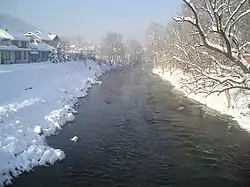
.jpg.webp)
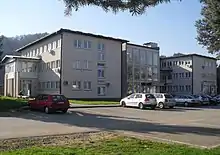
_-_panoramio.jpg.webp)
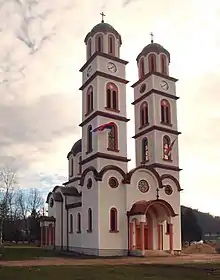
_01_-_panoramio.jpg.webp)
Population
| Population of settlements – Čelinac municipality | |||||
|---|---|---|---|---|---|
| Settlement | 1971. | 1981. | 1991. | 2013. | |
| Total | 17,430 | 18,354 | 18,713 | 15,117 | |
| 1 | Balte | 234 | 141 | ||
| 2 | Basići | 237 | 27 | ||
| 3 | Branešci Gornji | 645 | 375 | ||
| 4 | Branešci Donji | 779 | 555 | ||
| 5 | Brezičani | 517 | 393 | ||
| 6 | Vijačani Gornji | 544 | 362 | ||
| 7 | Grabovac | 648 | 568 | ||
| 8 | Dubrava Nova | 13 | 24 | ||
| 9 | Dubrava Stara | 771 | 614 | ||
| 10 | Jošavka Gornja | 563 | 441 | ||
| 11 | Jošavlka Donja | 957 | 746 | ||
| 12 | Kablovi | 294 | 118 | ||
| 13 | Kamenica | 28 | 38 | ||
| 14 | Lađevci | 527 | 303 | ||
| 15 | Lipovac | 308 | 119 | ||
| 16 | Markovac | 167 | 161 | ||
| 17 | Memići | 218 | 118 | ||
| 18 | Mehovci | 266 | 7 | ||
| 19 | Miloševo | 359 | 322 | ||
| 20 | Opsječko | 950 | 1,180 | ||
| 21 | Popovac | 306 | 144 | ||
| 22 | Skatavica | 149 | 70 | ||
| 23 | Crni Vrh | 756 | 520 | ||
| 24 | Čelinac | 1,321 | 3,136 | 4,857 | 5,097 |
| 25 | Čelinac Gornji | 513 | 514 | ||
| 26 | Šahinovići | 170 | 104 | ||
| 27 | Šnjegotina Velika | 836 | 534 | ||
| 28 | Šnjegotina Donja | 572 | 326 | ||
| 29 | Šnjegotina Srednja | 922 | 583 | ||
| 30 | Štrbe | 605 | 613 | ||
Ethnic composition
| Ethnic composition – Čelinac town | ||||
|---|---|---|---|---|
| Nationality | 2013. | 1991. | 1981. | 1971. |
| Total | 5.097 (100%) | 4.857 (100%) | 3.136 (100%) | 1.321 (100%) |
| Serbs | 3.450 (71,03%) | 1.798 (57,33%) | 569 (43,07%) | |
| Bosniaks | 1.005 (20,69%) | 817 (26,05%) | 694 (52,53%) | |
| Croats | 51 (1,05%) | 57 (1,81%) | 32 (2,42%) | |
| Yugoslavs | 234 (4,81%) | 402 (12,81%) | 7 (0,52%) | |
| Others | 117 (2,40%) | 62 (1,97%) | 19 (1,43%) | |
| Ethnic composition – Čelinac municipality | ||||
|---|---|---|---|---|
| Nationality | 2013. | 1991. | 1981. | 1971. |
| Total | 15.117 (100%) | 18.713 (100%) | 18.354 (100%) | 17.430 (100%) |
| Serbs | 14.508 (95,97%) | 16.554 (88,46%) | 15.832 (86,25%) | 15.880 (91,10%) |
| Bosniaks | 395 (2,61%) | 1.446 (7,72%) | 1.232 (6,71%) | 1.209 (6,93%) |
| Croats | 48 (0,32%) | 76 (0,40%) | 86 (0,46%) | 90 (0,51%) |
| Yugoslavs | 377 (2,01%) | 885 (4,82%) | 14 (0,08%) | |
| Others | 166 (1,1%) | 260 (1,38%) | 319 (1,73%) | 237 (1,35%) |
Economy
The following table gives a preview of total number of registered employed people per their core activity (as of 2016):[3]
| Activity | Total |
|---|---|
| Agriculture, forestry and fishing | 94 |
| Mining and quarrying | - |
| Manufacturing | 1,123 |
| Distribution of power, gas, steam and air-conditioning | 49 |
| Distribution of water and water waste management | 25 |
| Construction | 85 |
| Wholesale and retail, repair | 534 |
| Transportation and storage | 175 |
| Hotels and restaurants | 105 |
| Information and communication | 12 |
| Finance and insurance | 18 |
| Real estate activities | 2 |
| Professional, scientific and technical activities | 43 |
| Administrative and support services | 76 |
| Public administration and defence | 132 |
| Education | 253 |
| Healthcare and social work | 91 |
| Art, entertainment and recreation | 12 |
| Other service activities | 42 |
| Total | 2,871 |
See also
Notable people
- Radoslav Brđanin, politician
- Rajko Kuzmanović, politician
- Željko Blagojević, ultramarathon
References
- http://www.nacional.hr/clanak/33106/smanjena-kazna-bivsem-potpredsjedniku-vlade-bosanskih-srba%7C publisher=Nacional| title=Smanjena kazna bivšem potpredsjedniku vlade bosanskih Srba.
- "DA LI JE KARADŽIĆ BIO "NASILAN" ILI "VIOLENTAN"? - SENSE Agency - Vest". www.sense-agency.com. Retrieved 20 April 2018.
- "Cities and Municipalities of Republika Srpska 2017" (PDF). rzs.rs.ba (in Serbian). December 2017. Retrieved 21 October 2018.
